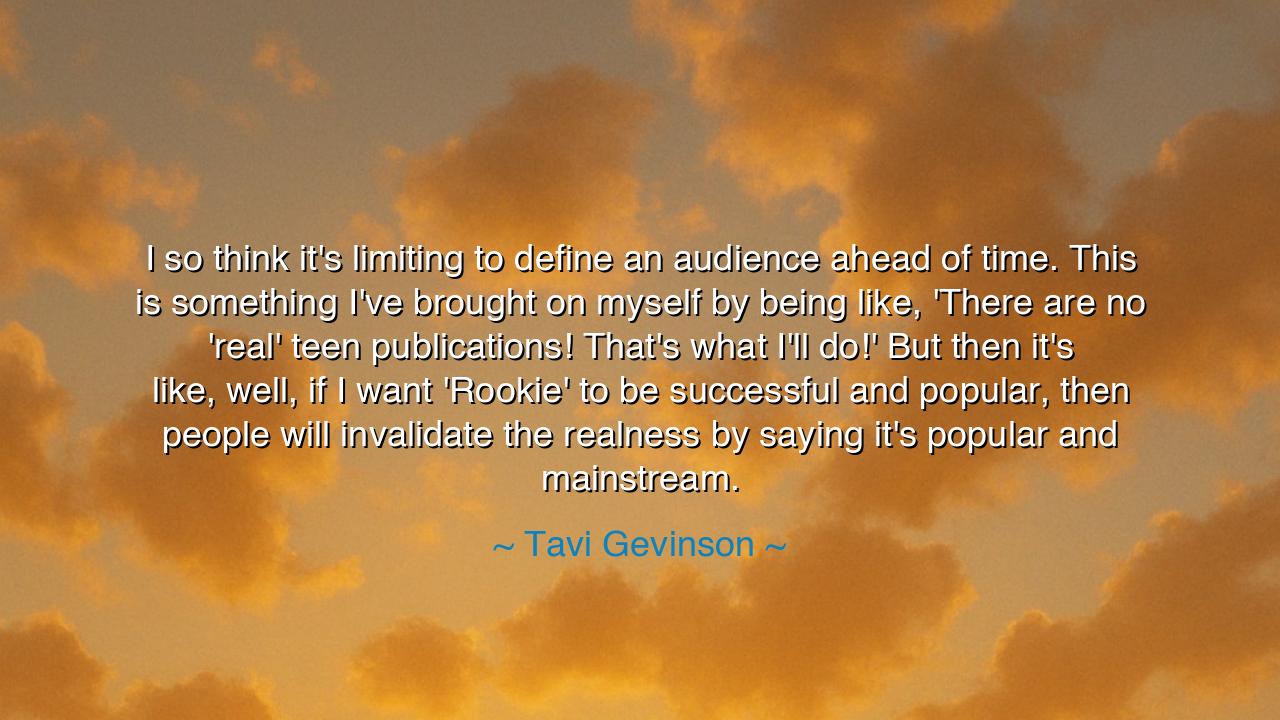
I so think it's limiting to define an audience ahead of time.
I so think it's limiting to define an audience ahead of time. This is something I've brought on myself by being like, 'There are no 'real' teen publications! That's what I'll do!' But then it's like, well, if I want 'Rookie' to be successful and popular, then people will invalidate the realness by saying it's popular and mainstream.






Hear the words of Tavi Gevinson, who reflected with wisdom far beyond her years: “I so think it’s limiting to define an audience ahead of time. This is something I’ve brought on myself by being like, ‘There are no ‘real’ teen publications! That’s what I’ll do!’ But then it’s like, well, if I want Rookie to be successful and popular, then people will invalidate the realness by saying it’s popular and mainstream.” In these words, she speaks not merely of magazines, but of the eternal struggle between authenticity and recognition, between the purity of vision and the burden of success.
To define an audience ahead of time, she says, is a form of imprisonment. For when we decide too early who will listen, who will read, who will watch, we carve away the unknown possibilities of who might be touched. It is the arrogance of control, a narrowing of vision. Gevinson reveals her rebellion against this, reminding us that true art cannot be confined to demographics and markets. The work must be made in truth, and the audience will find it. To limit the audience is to betray the spirit of creation.
Her founding of Rookie—a publication born of the belief that there were no “real” magazines speaking to teens in their full complexity—was itself an act of defiance. She gave voice to the unspoken, space to the unheard, and reflection to the young who hungered for authenticity. But with this came the paradox: when something born of rebellion becomes popular, it is dismissed by some as no longer “real.” Here lies the cruel irony—success is sometimes treated as corruption, as though to reach many hearts is to betray the truth that first gave rise to the vision.
History echoes this paradox. Consider Socrates, who walked the streets of Athens speaking truth to the young. At first, he was ignored, dismissed as a nuisance. But as more listened, as his ideas spread, he was accused of corrupting the youth and defying tradition. His growing popularity was used against him, for society often mistrusts what spreads too widely, fearing that truth, if too successful, loses its purity. In the same way, Gevinson knew that Rookie might be scorned not for failing, but for succeeding.
There is a quiet heroism in her words, for she names the burden all creators bear: the balance between remaining true to one’s vision and surviving in a world that demands numbers, growth, and mass appeal. Her honesty reflects the tension of any who create for others—musicians, writers, leaders. For to reach many is to risk being accused of selling out; to remain obscure is to risk fading away. She chose instead to walk the narrow road, creating for truth’s sake, regardless of whether it was labeled mainstream or not.
The lesson here is eternal: create for truth, not for validation. Do not be trapped by the voices that demand you limit your vision to a certain group, nor by those who accuse you of betrayal when your vision resonates with many. Authenticity is not measured by obscurity, nor is falseness proven by popularity. What matters is the honesty of the work, the integrity of the vision, the courage to make what you believe is missing from the world.
So let the words of Tavi Gevinson be carried forward: resist the urge to limit, resist the fear of success, and remain true to your voice. For whether it speaks to the few or to the many, whether it remains underground or becomes mainstream, its realness lies not in numbers, but in sincerity. And in that sincerity, your work will live—not as a product, but as a beacon for those who hunger for something true.






AAdministratorAdministrator
Welcome, honored guests. Please leave a comment, we will respond soon